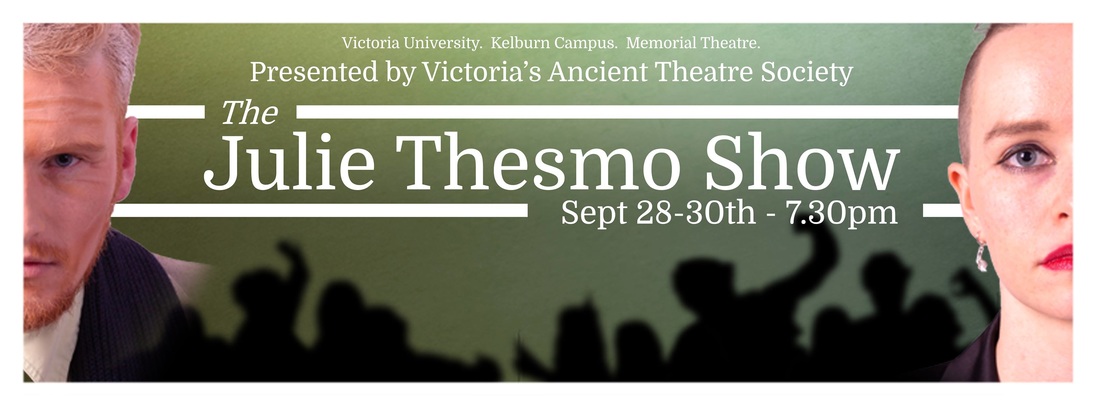Shannon Friday
The plot of The Julie Thesmo Show goeth thusly: Euripides, author of plays such as Medea, The Trojan Women, Bacchae, and Hippolytus, is pissed off that a whole bunch of women don’t like his writing. They’ve gathered in a secret enclave – although not that secret – to protest, and Euripides wants to charge in, guns blazing. The only problem? Dudes aren’t exactly allowed. So Euripides teams up with his genderqueer actor-friend Albert and the bro-tastic Cameron. Together, they decide that Cameron will dress up as a girl, infiltrate the meeting, and defend Euripides to the women.
But the play isn’t really about plot, except in the most tangential way. The plot is mostly an excuse to set up jokes about the battle of the sexes. And a reason to argue about the social importance of art and and an artist's responsibility for what their work says, both intended and unintended. After a short intro scene that introduces the dudes, the action shifts to Julie Thesmo Show, a daytime talk show that seems one part Oprah, one part Seven Sharp.
The production shifts back and forth between earnest appeals to the audience/camera and some absolutely fantastic satirical commercials, including a great piss-take of those hideous Lynx body spray ads. They sing an annoyingly chirpy Julie Thesmo Show theme song. In fact, they sing all of the sound cues in the show. It's a fantastic device, allowing feminine sound even in scenes that take place in male spaces, and I wish it were pushed even further.
The earnest appeals within the show give a variety of female perspectives on living in a male-dominated culture. And the closer the characters are to the actual students, the more commitment there is to pushing boundaries. Erin Kennedy's Lucy is played like a Twilight fangirl about to meet Taylor Lautner when she finally gets to speak to her hero Euripides. Isabella Murray's Tracy is a delightfully puffy academic, all theory and polysyllables, but with no ability to actually relate her ideas to the people around her. Meg Douty's TV producer Mel, on the other hand, is played with level 11 commitment, but a lack of specificity that means Mel comes off as shouty rather than no-nonsense and in control.
The Julie Thesmo Show lights up in its final episode, an extended multi-part interview between Julie and Euripides. The interview also feels so strong because it works with the venue. The Memorial Theatre might be the most light- and sound-tight venue in Wellington. Normally this would be an asset, but in a show with so much direct address, I feel oddly absent while the women onstage are pouring their hearts out to us. The production attempts to position the audience as camera, but it doesn’t really work. For example, a late appeal to the audience to shout the word “cunt” in an effort to reclaim it is jarring; the house lights have to turn back on before we can get involved.
But when called upon to judge the extended arguments of the interview, the distance is useful. Eilish Draper as Julie Thesmo and Tom Vassar as Euripides pursue those arguments with a heat that seems to leap across the space between them. Julie's charge that Euripides uses “interpretation as a shield for misogyny” butts up against Euripides’ assertion that the women’s dissent equals censorship. “Just because you don’t like something, you can’t silence it,” he shoots back. It’s a heated argument that resounds with immediacy. In director Mitchell Botting’s hands, the arguments are nuanced, going from intellectual games, to hurt shouting, to vicious attacks, to an attempt at reconciliation. It’s like the best parts of Frost/Nixon meet the high stakes of the US Presidential debate, with women’s role in media centre stage.
For me, The Julie Thesmo Show works best when each viewpoint is allowed to speak and we are allowed to see the impact of that opinion. When it feels like “doing theatre”, and doesn’t connect to the need to let us an audience be a community and argue as well, silently or otherwise, I tune out a little bit. As an adaptation, Julie Thesmo shows that these issues have been around at least as long as the gender binary as a construct, and aren’t likely to be resolved soon. And I enjoy seeing the multitude of experiences and perspectives on this treated with dignity, without being precious.






